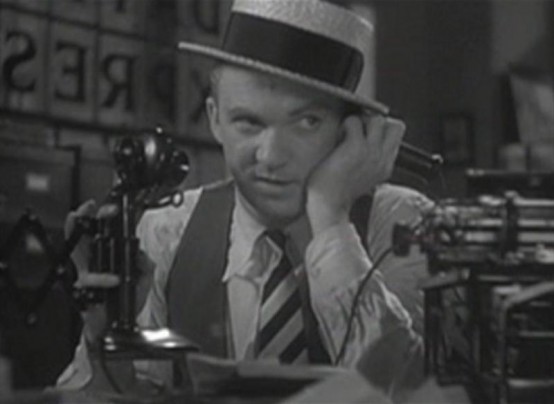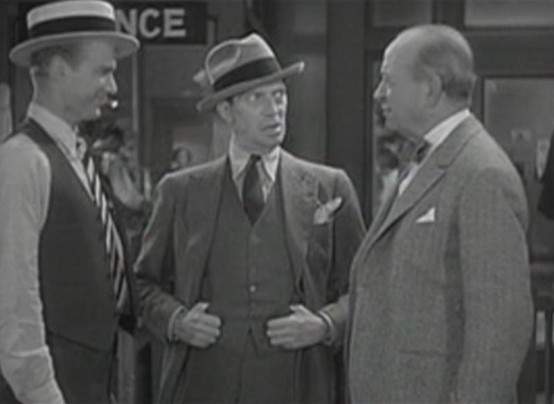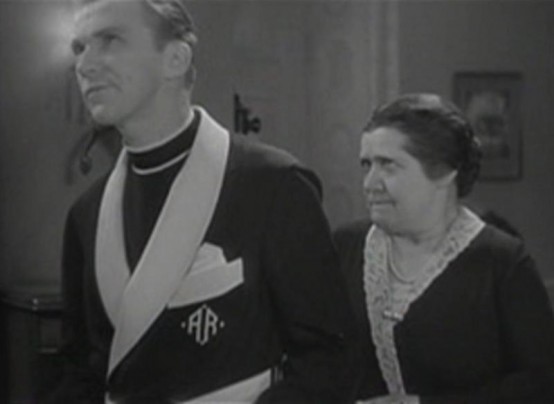It’s Lee Tracy day on TCM’s Summer Under the Stars, Thursday, August 21. The subject of the following article, Blessed Event, plays at 10 pm EDT on TCM Thursday night. Other Lee Tracy movies that TCM is showing and that I’ve written about include Millionaires in Prison (1940 – 12:15 pm), The Half-Naked Truth (1932 – 3:45 pm) and Clear All Wires! (1933 -4:30 am). Also, see here for a bit of a sidebar about the real-life press agent who The Half-Naked Truth is based upon.
Blessed Event has been Lee Tracy’s signature movie for a long time now. While he played supporting roles in titles of higher profile, such as horror entry Doctor X (1932) and, especially, star-studded classic Dinner at Eight (1933), and a case can be made for Bombshell (1933), which finds him as Jean Harlow’s leading man, Blessed Event is the only one of these titles that is wholly a Lee Tracy movie. The role is a perfect showcase for Tracy and for years it had been the best showcase of Tracy. But until recently many of Tracy’s best early starring efforts had not been available on home video except Blessed Event. Warner Archive has changed that and I think Blessed Event is knocked back a peg or three because of some of their recent issues.
Blessed Event has some weaknesses. Let’s get them out of the way.
Taking for granted that you enjoy Lee Tracy, the movie could be a hard sell if you’re not a fan of Dick Powell’s singing. Powell, in his film debut direct from a lengthy emcee gig in Pittsburgh, shows up in front of a mic so much that you’re almost waiting for Warner’s to unleash Busby Berkeley and a flock of chorus girls to accompany him (they don’t). If you like Powell, and most of us who like movies from this era do, then his crooning is a plus and this point is moot. If you don’t like him then be warned, you’ll have to endure him taking to the stage or airwaves three or four times throughout Blessed Event.
Alvin’s (Tracy) love interest in Blessed Event, Mary Brian as Gladys Price, is entirely unnecessary. Not only doesn’t she fit, she actually gets in the way of the story and bits of her dialogue don’t even make sense (Why is she so terrified of Bunny Harmon?). Brian herself is okay, though I’d have preferred to see one of the Warner’s regulars in the part. Her character has no obvious purpose. Maybe someone in casting liked her as the love interest in The Front Page (1931)* and thought they needed that touch here too. Maybe she’s around so we don’t doubt Alvin’s sexuality. To my mind she’s only stealing time from Ruth Donnelly, who has much greater chemistry with Tracy as Alvin’s secretary, Miss Stevens aka Stevie.
* Incidentally, Hildy Johnson in The Front Page was actually Lee Tracy’s breakthrough role on Broadway in its original 1928-29 run.
A third problem comes from Blessed Event’s thin story. Practically the entire first third of the movie is a non-stop stream of colorful dialogue highlighted by one liners that often work but just aren’t very meaningful beyond their moment. They are great for pacing though and are typically a joy even if the calories are empty. At its heart Blessed Event is about Alvin winning the war of words over guns versus gangster Sam Gobel (Edwin Maxwell) and his coming to grips with a moral misstep in his handling of the related Dorothy Lane (Isabel Jewell) story. Alvin’s war with Bunny Harmon is just extra flavor as is, less effectively, his romance with Gladys.
Based on these complaints you might think I dislike Blessed Event. That would be untrue, largely because I enjoy all of the Dick Powell tunes (especially the Shapiro Shoes jingle!) and accept all of the banter, which is after all a great showcase of Tracy’s skill as an actor. His speech threatening Frankie (Allen Jenkins) with the electric chair is practically performance art. My biggest problem is the Mary Brian character, but it turns out her part is small enough to make her only a minor distraction. I do think a handful of other pre-Code Lee Tracy titles rank over Blessed Event: Washington Merry-Go-Round, The Half-Naked Truth (1932) and The Nuisance (1933) come to mind, because each provides a platform for Lee Tracy equal to Blessed Event, and delivers a better overall story while doing so. But beyond sharing the era’s ultimate screen con artist in Tracy, Blessed Event has its own unique charms as well.
When it comes to characterizations of Walter Winchell, today more people are going to visualize Burt Lancaster’s J.J. Hunsecker in Sweet Smell of Success (1957) than are going to recall Tracy’s Alvin Roberts of a quarter century earlier in Blessed Event. But a lot happened during those twenty-five years to change the public’s perception of Winchell. At the time of Blessed Event he was a still a relatively recent phenomenon who carried a day-to-day relevancy. By various counts, Winchell’s column was then syndicated in 500 to 1,000 daily newspapers worldwide plus, like Alvin Roberts, he could be heard on the radio for fifteen minutes every Sunday night. The Winchell of the early ‘30s was primarily a gossip columnist whose politics were strictly New Deal. Later in the decade he was rabidly anti-Hitler and anti-Fascist, becoming even more politically feisty as America approached entry into World War II. Red-baiting and McCarthyism came later.
The pre-Blessed Event model of Winchell was a figure feared by the rich and famous, who entertained the masses with an endless parade of snappy columns filled with a slang seemingly all his own, yet understood by his readership. A sixth-grade dropout with a background in vaudeville, Winchell began his journalistic career with a pair of columns in New York City’s Vaudeville News. Their titles, “Merciless Truth” and “Broadway Hearsay,” are harbingers of what was to soon come. In 1925 he went to work at New York Evening Graphic, where he held several different posts including, like Alvin Roberts, advertising manager. Winchell reached critical mass when hired by William Randolph Hearst’s New York Mirror in 1929, the same year he began his radio show. Even as his reputation slid in later years, Winchell remained with the Daily Mirror until it went “pfft” in ’63 and he continued to be employed by the Hearst Corporation until he was let go in 1967.Blessed Event opens with a man complaining to Miller (Walter Walker), publisher of the Daily Express: “Why I used to be the only one in the house that looked at the paper. But since you’ve been running this filth about blessed events, my wife and my two daughters, and even my maid, make a beeline for that paper. It shouldn’t be allowed in respectable homes.”
Miller predictably loves all of the extra eyes that this new bit of sensationalism is bringing to the Express. He discovers that regular columnist Moxley (Ned Sparks) is on vacation and has left his column in the hands of Alvin Roberts from the ad department. Moxley returns and scolds Alvin for “using my column to print a lot of dirty stories,” including all of those announcements about women who are expecting. “Yeah, but I invented a new way of saying it,” Alvin explains, touting his term, “blessed event.”
Moxley is shortly reassigned to head the newly created pet department while Alvin is allowed to run rampant with his announcements of blessed events, no matter how many lawsuits he causes the Express.
Blessed Event was the talk of Broadway for a brief time a little earlier in 1932. The play by Manuel Seff and Forrest Wilson starred Roger Pryor as Alvin Roberts and included cast members who would come to Hollywood to appear in the movie, most notably Allen Jenkins and Isabel Jewell. It opened at the Longacre Theatre in February and Warner Bros. bought screen rights less than a month later. Director Roy Del Ruth went to New York to see it, as did James Cagney, who was planned to star in the movie version from the start.
Cagney had been earning big dollars for Warner Bros. ever since The Public Enemy (1931) and showed no signs of slowing down. He had just finished work on Winner Take All (1932) at this time and decided that he wanted to be paid in better accordance with his substantial earning power. He even offered to do Blessed Event, 20,000 Years in Sing Sing, and one additional title free of charge, provided a new contract at the end of that year compensated him in terms of his true value (McCabe 98). By the time Cagney and Warner Bros. settled this, their first round of differences, and the popular actor went back to work, Blessed Event was already in theaters.In their April 18 edition Film Daily speculated that either Jack Oakie or Lee Tracy would be cast in the Winchell based role. I like Oakie and I absolutely love Cagney, but neither would have made as good an Alvin Roberts as Lee Tracy. Would you buy Cagney at war with Dick Powell? Even if you could, we’ve seen Cagney go completely manic in Winner Take All and, a little later, Jimmy the Gent (1934), which to my mind makes this type of portrayal hit or miss for him. Thinking of the later Boy Meets Girl (1938) tilts that towards miss. No, I think Cagney would have tended to come across more as mug than smooth operator, and Tracy, who had played similar characters for the company earlier that year in The Strange Love of Molly Louvain and Doctor X, was exactly who the part called for.
Director Roy Del Ruth finished work on Blessed Event in then record time, just twelve shooting days! Other than Alvin’s office, the only other major scenes in the movie take place in his apartment and at Bunny Harmon’s (Powell) Chateau Harmony. Those few sets host a parade of actors, each giving highly caffeinated performances, and leaves little to be surprised about over the lightning-fast production time. The movie moves at an appropriate clip with a speed that actually resembles one of Winchell’s own ellipsis-packed daily columns.
Blessed Event opened in Hollywood on September 1, 1932 and followed up the next day in New York at the Strand before opening nationwide September 10. Press campaigns targeted newspapers that syndicated Winchell, plus some extra promotion surrounding Dick Powell back in Pittsburgh, where he had worked the Stanley Theater for the past few years.
The Powell character, by the way, Bunny Harmon, the self-dubbed “old music master,” who Alvin feuds with throughout Blessed Event, was based on, yowsah, yowsah, yowsah, the “Old Maestro” himself, Ben Bernie. Bernie and Winchell were already carrying on their public feud by this time, though theirs was a mock feud intended to work audiences and build crowds for joint events. That’s why Blessed Event is so hell-bent upon Alvin crashing Bunny’s opening at Chateau Harmony. But Winchell and Bernie weren’t as antagonistic towards one another in real life as Alvin and Bunny are in Blessed Event. The two men eventually even co-headlined a couple of Twentieth Century-Fox releases later in the decade, Wake Up and Live and Love and Hisses (both 1937).Besides Lee Tracy, who is an absolute dynamo as Alvin, Blessed Event features excellent performances from Ruth Donnelly, as Alvin’s quick-witted secretary Stevie; Emma Dunn as Alvin’s space-cadet Bunny Harmon-loving mother; Walter Walker as the penny-pinching, profit-loving publisher Mr. Miller; Edwin Maxwell perfect as a crime boss who appears in Alvin’s column more than he would like; Allen Jenkins, reprising his stage role and turning in great supporting work as Maxwell’s muscle from Chicago. He’s intended to silence Alvin, but quickly finds himself at Alvin’s mercy and develops into a sidekick of sorts.
Isabel Jewell also comes to the movie from the stage production. As singer Dorothy Lane, she accidentally dishes news of her own impending blessed event to Alvin. After Alvin breaks his promise to stay silent over the matter, it is revealed that he does actually have a conscience.
Ned Sparks fans will want more Moxley, but Ned’s just fine here and gets off a couple of good lines to each Alvin and Miller once Moxley is transferred to the pet department. Anybody could have played Frank McHugh’s small part, though Tom Dugan felt just right in his. Jack La Rue is another Edwin Maxwell henchman, interesting in that he and Jenkins are paired together in the same occupation for the similarly built, but better-known, Edward Arnold in Three On a Match (also 1932). Charles Lane pops up to pass on an idea to Alvin. Then he disappears. Similarly, Herman Bing has a couple of lines near the end and Robert Emmett O’Connor fans will surely chuckle when his usual cop appears near the end of the movie. I don’t think Jack La Rue shared in the laughs though.
Possibly more fun than Blessed Event itself comes in reading some of Walter Winchell’s early columns for additional background. Even from the start of his Hearst column in 1929 to the time of Blessed Event you can spot Winchell’s more traditional paragraphs being pared down to one-line tidbits. References to “blessed events” and relationships going “pfft” do actually make their way into most columns, as do Winchell’s little parenthetical digs, just as Tracy’s Alvin Roberts quotes off-the-cuff to Stevie. Many of Winchell’s references come across as obscure or even unknown today, and certainly many readers were sometimes left puzzling over just who or even what he was referencing back then too. His offhand style comes across as more jolly than meanspirited, his little digs are often funny to anyone but their victim. But for someone introspective enough to lay the paper aside and think it over, you can be sure this wasn’t a man you’d want to cross.“Most of the current slang came from the underworld and the show-shops—and most of us credited with creating colorful wordage—merely passed it along” — Walter Winchell, On Broadway, January 19, 1934.
As outlined above, Blessed Event is far from a perfect movie. It is a near perfect portrayal by Tracy, however. He and director Roy Del Ruth deserve credit for injecting so much life into an adaptation that somehow, despite its few sets and voluminous dialogue, doesn’t feel nearly as stage bound or talky as other early productions taken from Broadway.
Blessed Event is available as a Manufactured-On-Demand DVD-R from Warner Archive. My screen captures come from a past recording taken from Turner Classic Movies.
No surprise, but Danny at Pre-Code.com has covered Blessed Event. So too has Laura at Laura’s Miscellaneous Musings. Each of them enjoyed it.
Cited
In addition to Film Daily issues dated March 4–September 8, 1932, accessed through the Lantern Search engine, the following sources were used:
- McCabe, John. Cagney
. New York: Carrol & Graf, 1999.
- Winchell, Walter. “On Broadway.” Syracuse Journal 19 Jan 1934: 11. Web. Old Fulton NY Postcards 19 Aug 2014.


















Be honest I never seen this movie Blessed event I thought I saw all of his films on TCM
I am dvr I am watching Lone Wolf movie right now on Gettv
It’s starting on TCM — Now! But do enjoy the Lone Wolf if you’re sticking with him. Fun movies!
I just turn into Blessed event on DVR this afternoon OH MANN I don’t know who more snarky former Deadline Hollywood editor Nikki Finke or Lee Tracy in this role
LOL!
BTW do profile on Grit tv they been showing a lot of John Wayne other movies and western also Cisco Kids western in the movie if you get in your area that might be future profile check it out
I got grandfather in here in SO CAL on KHTR Channel 46.4 whih is Univision subchannel right next to Gettv here in Los Angeles market
I’d say Lee Tracy invented that snark, but I guess we’ve got to credit Walter Winchell. Some of those old columns are hilarious, when you can figure out who and what he’s talking about!
Don’t know Grit. Sounds a bit heavy on the Westerns to my taste.
Yeah I think Lee is more snarky than Walter Winchell in his prime or Nikki Finke from Deadline Hollyweird formerly LOL!
Grit slowly coming to other market they been showing some action films lately on that I saw John Wayne Spoiler and Shepard of the hills this weekend